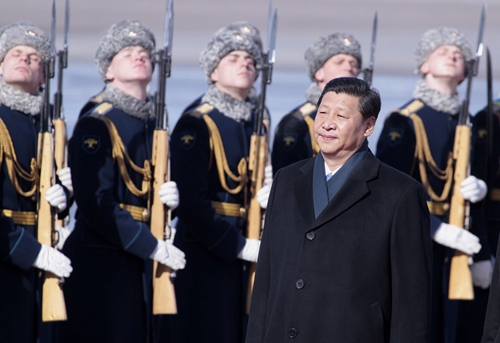

 |
| President Xi's last visit to Russia. (Photo/Xinhuanet) |
BEIJING, May 5 -- During Chinese President Xi Jinping's upcoming trip to Russia, Kazakhstan and Belarus, a highlight would be his attendance at the Victory Day commemoration in Mosocw, which demonstrates China's determination to safeguard the post-WWII world order.
Xi is also set to deepen win-win cooperation with the three nations, push forward the construction of the Silk Road Economic Belt while seeking common development with existing economic belt initiatives.
REMEMBER HISTORY & SAFEGUARD WORLD PEACE
During his visit, Xi will attend the ceremony to commemorate the 70th anniversary of Russia's defeat of Nazi Germany, meet with WWII veterans from Russia and Belarus, and visit the Belarusian State Museum of the Great Patriotic War.
Xi's participation in the Moscow event and related activities illustrates that China attaches great importance to remembering the WWII history and safeguarding the post-war world order.
"It's necessary for us to remember the history, draw lessons from past tragedy and gain power from victory, and keep vigilant against the tendency to whitewash reviving militarism and fascism," said Li Ziguo, deputy director of the department of European-Central Asian Studies, the China Institute of International Studies.
As the respective main battlefield in Asia and Europe, China and Russia both made enormous contributions to the victory of the World Anti-fascist War. The two sides have decided to hold a series of activities together to mark the 70th anniversary of the victory.
PUSH FORWARD "SILK ROAD ECONOMIC BELT"
Xi's upcoming visit is also set to push forward the realization of the China-proposed Silk Road Economic Belt initiative, which aims to enhance the interconnectivity between Eastern, Central, Western Asia and Europe.
"The construction of the Silk Road Economic Belt will provide a new opportunity for deepening the cooperation between China and the three countries, and will prompt regional economic cooperation to take on a new look with a more mutually beneficial and strategic nature," said Sun Zhuangzhi, a Russia expert at the Chinese Academy of Social Sciences.
During Xi's visit, China and Russia will sign a series of cooperation accords on key programs on energy, finance, investment and infrastructure, and also set the priority for next-stage cooperation.
Compared with the high level of political cooperation, there is huge room to enhance the practical cooperation in finance and investment between Russia and China, said Andrei Ostrovsky, deputy director of the Far East Research Institute of Russia's Science Academy.
After Russia, Xi will pay a visit to Belarus, the first by a Chinese president in 14 years. It will help turn the China-Belarus industrial park into a flagship program of the economic belt, China's former ambassador to Belarus Lu Guicheng said.
Xi will also visit Kazakhstan, where he first proposed the idea of the Silk Road Economic Belt in September 2013.
The Belt initiative will develop along with each country's development strategy and complement each other, such as the Russia-led cross-Eurasian passage.
The initiative will benefit the infrastructure in Russia's Fast East areas, making it necessary for Russia to enhance cooperation with China under the framework of the Belt, said Nikita Maslennikov, economist at the Institute of Contemporary Development of Russia.
As an open economic cooperation platform, the Belt initiative is expected to become a bridge that connects the Eurasian Economic Union and the Asia-Pacific economic circle, injecting fresh vigor into the development of the region.
 J-11 fighters in air exercise
J-11 fighters in air exercise Beauties dancing on the rings
Beauties dancing on the rings Attendants-to-be join Mr. & Miss Campus Contest
Attendants-to-be join Mr. & Miss Campus Contest Beijing's toughest anti-smoking law takes effect
Beijing's toughest anti-smoking law takes effect Family lives in cave for about 50 years in SW China
Family lives in cave for about 50 years in SW China PLA soldiers operating vehicle-mounted guns in drill
PLA soldiers operating vehicle-mounted guns in drill Blind carpenter in E China's Jiangxi
Blind carpenter in E China's Jiangxi China hosts overseas disaster relief exercise for the first time
China hosts overseas disaster relief exercise for the first time 20 pairs of twins who will become flight attendants in Sichuan
20 pairs of twins who will become flight attendants in Sichuan Obama is sowing discontent in S.China Sea
Obama is sowing discontent in S.China Sea Rescuers work through night to reach cruise ship survivors
Rescuers work through night to reach cruise ship survivors Driving through limbo
Driving through limbo Facing down MERS
Facing down MERSDay|Week